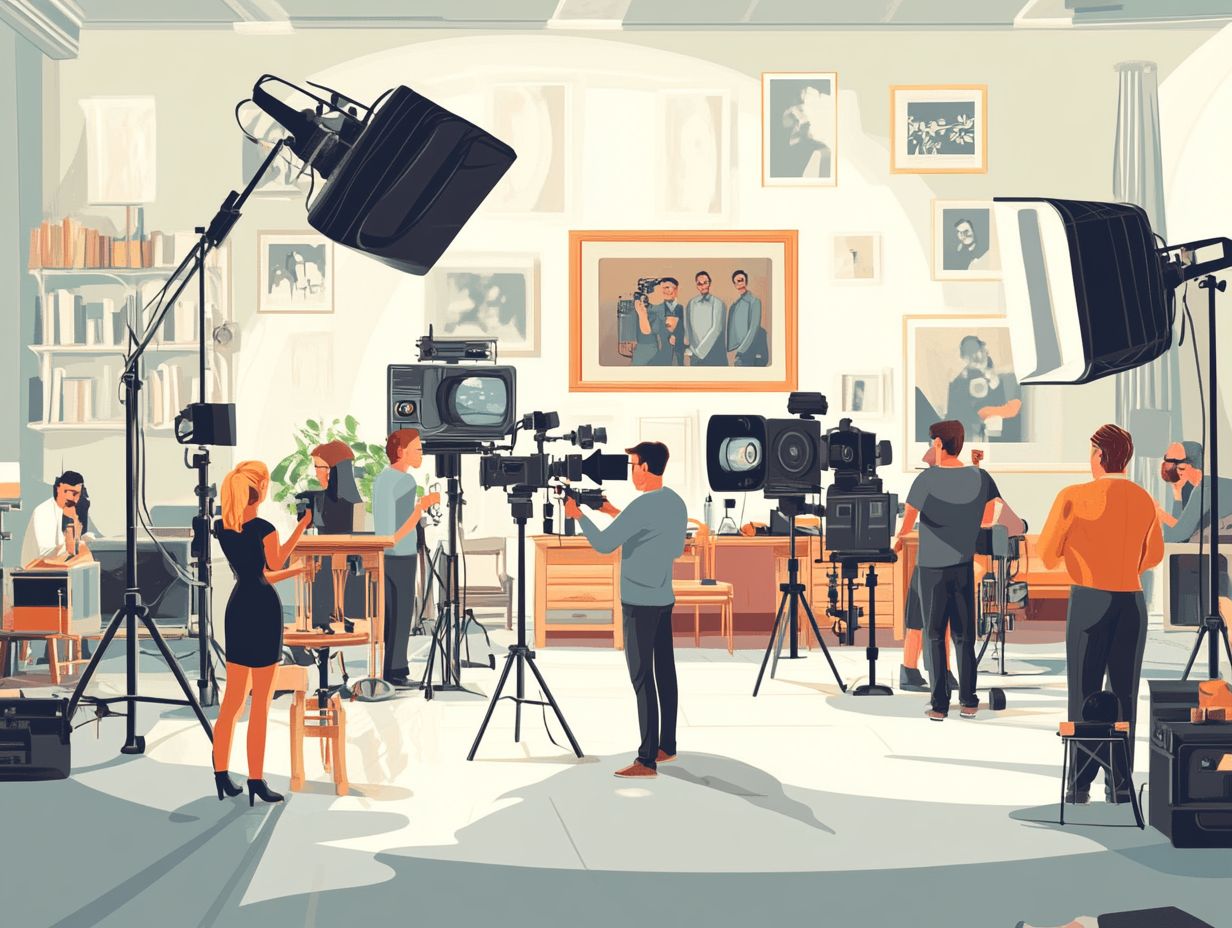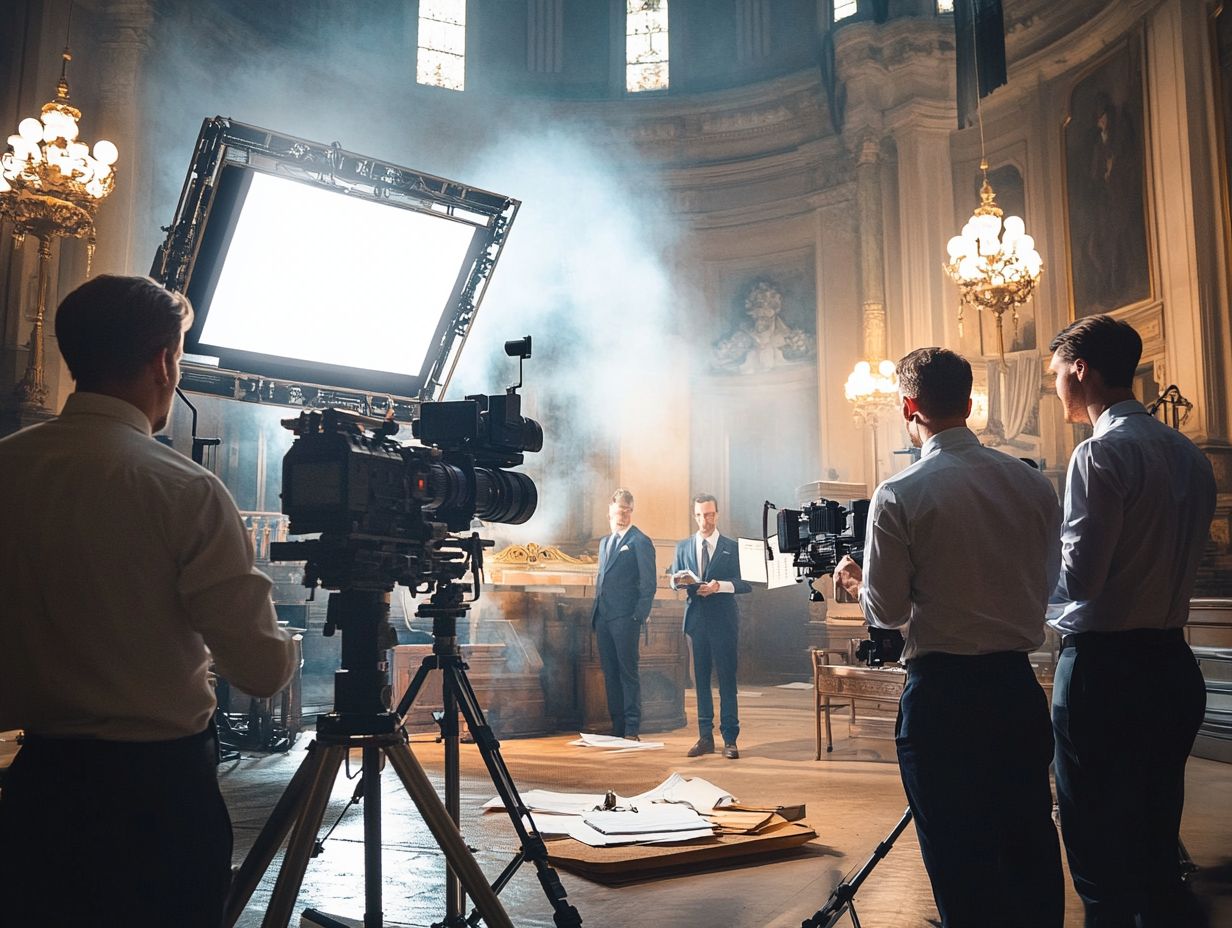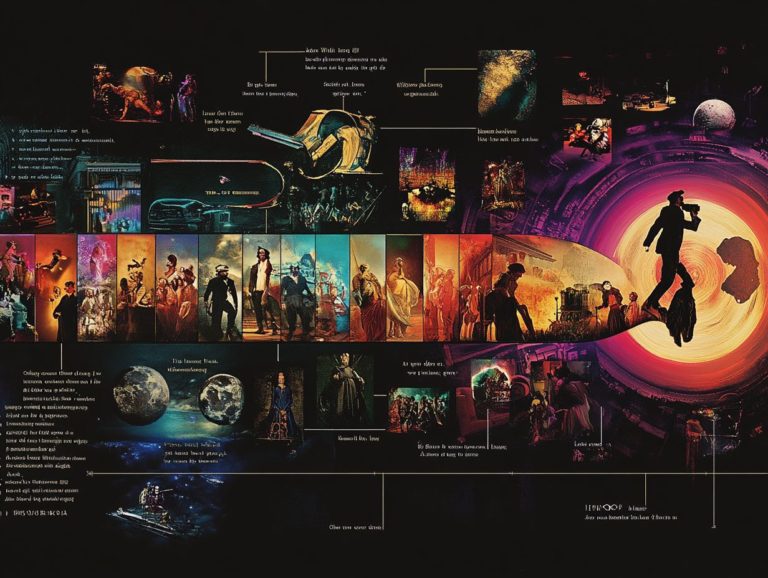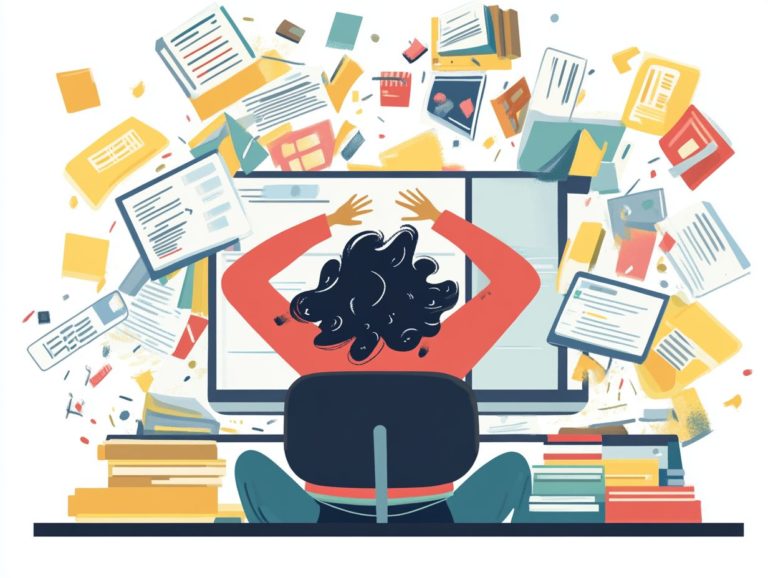How Copyright Impacts the Film and Television Industry
Copyright is essential in shaping the film and television industry. It protects the creative ideas and works that people create, ensuring that their contributions remain economically viable.
Let s dive into the basics of copyright and discover why it matters! This article highlights the significance of copyright within the industry, including key laws and regulations that govern it. You’ll learn about the delicate balance between safeguarding creative freedom and fostering profitability.
We will examine real cases of copyright infringement and explore effective strategies for protecting your intellectual property.
Understanding copyright is not just important it s crucial for your success in this fast-paced industry!
Contents
- Key Takeaways:
- Overview of Copyright in the Film and Television Industry
- Copyright Law and Regulations
- Impact of Copyright on the Industry
- Copyright Infringement in the Industry
- Protecting Copyright in the Industry
- Measures and Strategies for Protecting Copyright
- Frequently Asked Questions
- How does copyright impact the film and television industry?
- What are the benefits of copyright for the film and television industry?
- How does copyright impact the distribution of films and television shows?
- What happens if someone infringes on copyright in the film and television industry?
- How has copyright changed in the film and television industry over the years?
- What do creators need to do to ensure their work is protected by copyright?
Key Takeaways:
- Copyright is crucial in the film and television industry, protecting the rights of creators and ensuring profitability.
- Key laws and regulations play a significant role in shaping the industry and protecting copyright.
- Copyright infringement can harm both creative freedom and financial success, making protection strategies essential for the industry.

Overview of Copyright in the Film and Television Industry
The film and television industry has been profoundly influenced by copyright frameworks, which play a crucial role in the impact of copyright on artists and creators. These frameworks allow you to protect your original works and creative ideas.
In today s digital age, where media entertainment is constantly evolving, understanding copyright ownership and the legal protections that come with it is essential for film distributors, production houses, and content creators.
The Copyright Act and Copyright Rules serve as vital anchors, ensuring economic success while tackling piracy and infringement issues.
What is Copyright?
Copyright is a vital legal structure that safeguards original works of authorship. It forms a foundational pillar in intellectual property, enabling creators whether in film or television to maintain control over their artistic outputs.
This protection ensures creators receive both recognition and fair compensation for their contributions.
Any expression of ideas, from a script to a visual artwork, qualifies as an original work if it shows creativity. This guarantee protects creative endeavors in the film and television industries from unauthorized use. It allows artists to embark on innovative projects without the fear of exploitation.
By clarifying ownership rights, copyright cultivates an environment where creativity thrives. This benefits not just the creators, but also the audiences who appreciate their unique visions.
Importance of Copyright in the Industry
Copyright protection is vital for ensuring economic success in the film and television industry. It safeguards the investments made by distributors and creators alike.
By establishing clear ownership rights, you can secure revenue through licensing deals and royalties. This fosters an environment where artistic innovation flourishes.
The assurance that your work is protected from unauthorized use allows you to invest your time, resources, and creativity into new projects, confident that you’ll reap the rewards.
Copyright protection boosts investor confidence by minimizing the risks associated with potential losses from piracy or misuse. This collective security significantly contributes to the sustainability of the film industry, enabling continuous growth and the discovery of fresh talent.
Copyright Law and Regulations

The framework of copyright law plays a crucial role in the film and television industry. It sets forth regulations that dictate the use and distribution of creative works.
Its primary aim is to prevent infringement and piracy, ensuring that artistic endeavors are protected and respected.
Take action now to protect your creative works and ensure your success in the industry!
Key Laws and Regulations Affecting the Industry
Several key laws and regulations shape the landscape of copyright in the film and television industry. The Copyright Act stands out as one of the most significant legal frameworks.
This act explains the rights of creators and the protections afforded to their works. It ensures their intellectual property isn t exploited without consent.
Specific provisions within the act address fair use, which is crucial for enabling limited sharing and transformation of content for educational or critique purposes. This helps strike a balance between creators’ rights and public access.
Regulations concerning licensing, distribution, and derivative works assist filmmakers in navigating the intricate terrain of copyright. Robust piracy laws deter unlawful reproductions and distributions, underscoring the importance of safeguarding original content.
Ultimately, this framework nurtures a creative environment where innovation can flourish.
Impact of Copyright on the Industry
The influence of copyright on the film and television industry is significant. It shapes not only your creative freedom but also the profitability of your works in a competitive landscape.
Understanding this dynamic can enable you to navigate the complexities of the industry while protecting your artistic vision and financial success.
Effects on Creative Freedom and Profitability
The relationship between copyright and creative freedom is intricate. It can both empower you as a creator and impose limitations that impact your profitability.
On one hand, copyright offers essential protection to maintain control over your original works. This safeguard ignites artistic innovation, allowing you to explore unique narratives without the constant worry of exploitation.
Imagine the success of franchises like Marvel. Their robust copyright protections have led to significant economic gains and fostered ongoing creativity.
On the flip side, overly stringent copyright laws can hinder collaboration and restrict your ability to build upon existing works. This is evident in recent debates surrounding adaptations of classic stories, where creators grapple with tight regulations.
Therefore, while copyright is a vital framework for creative industries, it s crucial to find a balance between your rights as a creator and the necessity for broader access and inspiration within the film community.
Copyright Infringement in the Industry

Copyright infringement poses a significant challenge in the film and television industry. It takes on various forms that threaten the integrity of original creations.
Examples of Copyright Infringement in Film and Television
Numerous high-profile cases of copyright infringement in film and television illustrate the ongoing struggle against the unauthorized use of creative works. These situations undermine the rights of original creators and set significant legal precedents that influence the industry.
Imagine the landmark case of Disney v. VidAngel. It emphasized the crucial need for creators to maintain control over their content, as VidAngel was held liable for streaming altered versions of Disney films without permission.
Similarly, consider the dispute surrounding the Ghostbusters franchise. Writers asserted copyright infringement when a 2016 reboot borrowed elements that felt uncomfortably close to their original scripts. These cases serve as cautionary tales, highlighting the potential financial and legal repercussions infringers may face.
They also reinforce the essential need for fair licensing practices in an industry built on creativity and innovation.
Protecting Copyright in the Industry
Protecting your copyright in the film and television industry is crucial for your creative future! This requires a robust combination of measures and strategies to ensure compliance and effective enforcement.
By prioritizing these efforts, you can secure your creative works and uphold the integrity of your contributions to the industry. Take steps today to protect your creations!
Measures and Strategies for Protecting Copyright
Effective copyright protection strategies encompass measures to safeguard your creative works from unauthorized use. These strategies are tailored to fit your specific needs.
Initiating legal actions, such as filing for copyright registration, provides you with a formal assertion of ownership. This not only establishes your rights but also enables you to seek punitive damages should infringement occur.
Using technological solutions like digital rights management (DRM) lets you monitor and control access to your copyrighted materials effectively.
Collaboration across industries by forming coalitions among artists, publishers, and technology companies can foster robust advocacy for copyright laws. This collaboration facilitates the sharing of best practices. Through these combined efforts, you can fortify your defenses against infringement and nurture a culture that respects intellectual property.
Frequently Asked Questions

How does copyright impact the film and television industry?
Copyright is a form of legal protection that gives creators and owners of original creative works, such as films and television shows, exclusive rights to reproduce, distribute, and publicly display their work. Without copyright protection, creators would lack control over how their work is used or how they are compensated. This lack of control could significantly impact the film and television industry.
What are the benefits of copyright for the film and television industry?
The biggest benefit of copyright for the film and television industry is the protection it provides for creators and their works. This protection allows creators to control how their work is used and ensures they are fairly compensated. Copyright fuels creativity, inspiring creators to develop fresh and exciting new works!
How does copyright impact the distribution of films and television shows?
Copyright plays a crucial role in the distribution of films and television shows. It allows creators and production companies to control how and where their content is distributed. This control ensures that they are properly compensated for their work. Copyright also helps prevent unauthorized distribution and piracy, which can significantly impact the revenue and success of a film or television show.
What happens if someone infringes on copyright in the film and television industry?
If someone uses copyrighted material without permission, they are infringing on copyright and could face legal consequences. The copyright owner has the right to take legal action against the infringer, which could result in fines, damages, and even criminal charges. In the film and television industry, copyright infringement can also lead to the removal of content and a loss of revenue for the creators and production companies.
How has copyright changed in the film and television industry over the years?
With advancements in technology and the rise of digital media, copyright has become even more important in the film and television industry. As the internet has made it easier to copy and distribute content, copyright laws have evolved to protect creators and their works in the digital age. The rise of streaming services and online content has also brought about new challenges and debates surrounding copyright in the industry.
What do creators need to do to ensure their work is protected by copyright?
In most countries, copyright is automatically granted once a work is created and fixed in a tangible form, such as a film or television show. However, creators can take additional steps to protect their work, such as registering their copyright with their country’s copyright office. It is also important for creators to properly attribute their work to avoid any potential copyright issues.
Take charge of your creative rights today! Protect your work and invest in your future.






